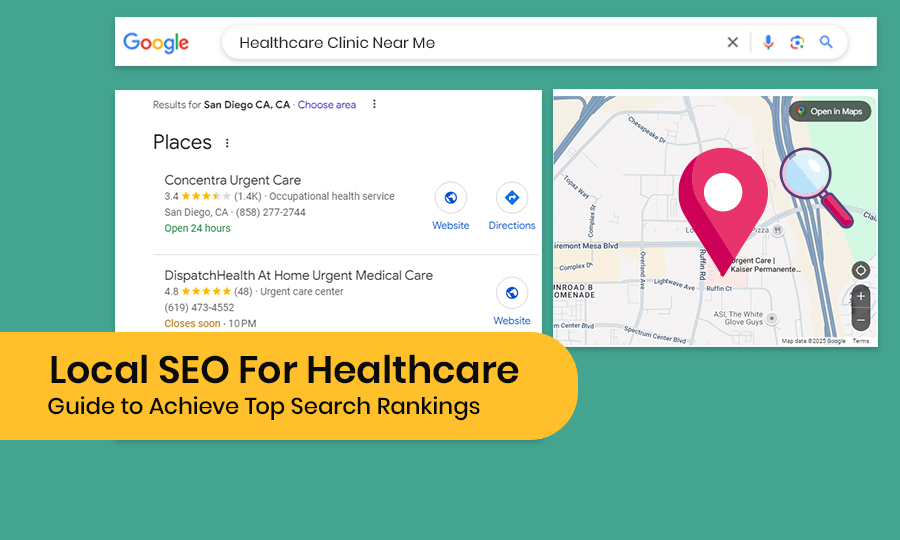The medical industry currently depends on local SEO for healthcare more than ever to acquire new patients and build an online presence in the locality. As a result, local search engine optimization (SEO) is a key focus for healthcare professionals of all types.
From family doctors and general physicians to pediatrics and mental health professionals, healthcare providers must practice an effective local SEO strategy to make sure that their clinic is conveniently found online. Local SEO for healthcare services improves your practice’s visibility in search engines when potential patients look for services in their locality.
Thanks to today’s digital landscape, medical professionals need to follow diverse healthcare marketing trends to advertise their practice. That’s why countless websites are posting different content on various healthcare practices, making it easier for patients to make informed clinical decisions.
An optimized healthcare website is great for acquiring new patients. Lots of consumers search for local doctors online, making it a perfect opportunity for local clinics to increase their reach.
If you want to rank your local medical clinic higher in your Google search engine results, you have come to the right spot! This blog will cover the most effective local SEO strategies to boost your practice’s digital visibility!
What is Local SEO for Healthcare?
This is when you optimize the online presence of your practice’s website so that it appears at the top of local search engine results when potential patients look for clinical services in their area. For most healthcare services, the key goal of local SEO is to push your facility to the top of Google Search results and Google Maps. This is known as Google’s local pack and is the place where countless local searches take place.
This can be done by considering several factors. For example, you would probably need to optimize the Google Business Profile (GBP) of your clinic. Additionally, you also need to collect patient reviews, consistently add local citations in important directories, and optimize your website with location-focused content and local keywords.
Why is Local SEO Important for the Healthcare Industry?
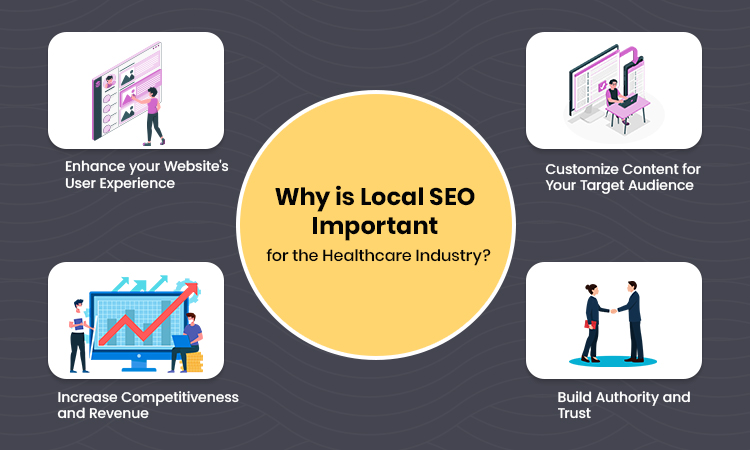
If implemented correctly, local SEO for healthcare can help your facility stand apart, expand your credibility, and boost your visibility when needed the most.
Nevertheless, let’s take a deeper look at why local SEO is important for the healthcare industry.
1. Reach More Patients through Local Searches
Approximately 1 out of every 20 Google searches are related to medical information. Moreover, two-thirds of these searches are about people looking for clinical information in their locality (“near town”, “near me” or “medical clinic in town”).
Such data reflect the growing importance of healthcare marketing trends for medical practices. Your practice will risk losing out on a big chunk of the patient community in your locality in the absence of a good local SEO strategy.
2. Enhance your Website’s User Experience
Comprehensive local SEO strategies can also improve the user experience of your facility’s website. When you optimize your website for local keywords and search results, you can post useful information. This could be about the services, operating hours, and location of your clinic. Such information makes it easy for local patients to find you and visit you.
3. Customize Content for Your Target Audience
Local SEO for healthcare also encourages doctors to develop content that aligns with the needs of their local patients. This customized strategy ensures that your clinic’s website caters to the specific interests and needs of your community. This will help you attract and retain more patients.
4. Build Authority and Trust
Patients look at you as a trustworthy healthcare provider when you show up in local searches and listings. Local SEO is therefore great for making a solid first impression! Once you position yourself as a medical authority, you start gaining new patients!
5. Increase Competitiveness and Revenue
An optimized local SEO strategy will give you several benefits. These include better local SEO rankings, improved conversion rates, and decreased marketing expenditures. Additionally, it also places your clinic beside your rivals, enabling you to effectively compete for potential patients in your locality.
Top 7 Local SEO Strategies to Boost Your Online Practice’s Visibility
Did you know that almost 99% of consumers use the Internet to look for local businesses? Moreover, approximately 88% of people who search the Internet on their smartphone are likely to call or visit a store within a day.
What do these figures indicate? Consumers use the Internet every day to look for services and products in their neighborhoods. If they can’t find your clinic in these local searches, you’re losing out on possible patients. To show that local SEO for healthcare is something you shouldn’t miss out on, we’ve collected a list of top strategies. Let’s dive right in if you’re still wondering how you can boost your facility’s online presence.
1. Optimize your Google Business Profile
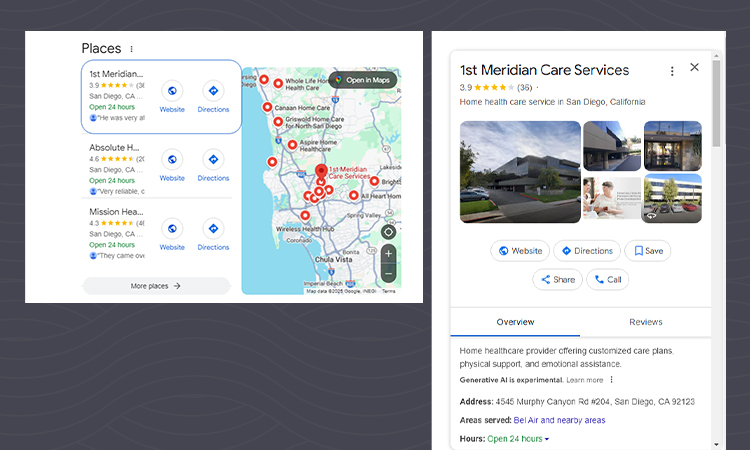
Regardless of your services, the first step towards online visibility is to claim and optimize your Google Business Profile (GBP). This is a free resource that will help your healthcare practice manage its presence across Google Maps and Search. Consumers have a times higher likelihood to trust a healthcare website if they can view its complete details on GBP and Maps.
The first step is to claim your GBP listing. Then you need to select the most relevant secondary and primary categories to provide the correct details for your business. For example, you would need to include the working hours, contacts, address, and a detailed description of the services provided by your medical practice.
Next, you need to upload some high-quality pictures for your healthcare practice. You can also use other GBP features to showcase your services and boost engagement, leading to more consumer leads. For example, you can use GBP Posts to advertise special aspects about your clinic, like 24/7 doctor availability, a 15% discount on the first 3 appointments, and so on.
Speaking of appointments, remember to include a direct link for bookings to your GBP. This will make it convenient for your patients to book doctor appointments and decrease the number of emails, calls, or messages.
2. Manage and Engage with Patient Reviews
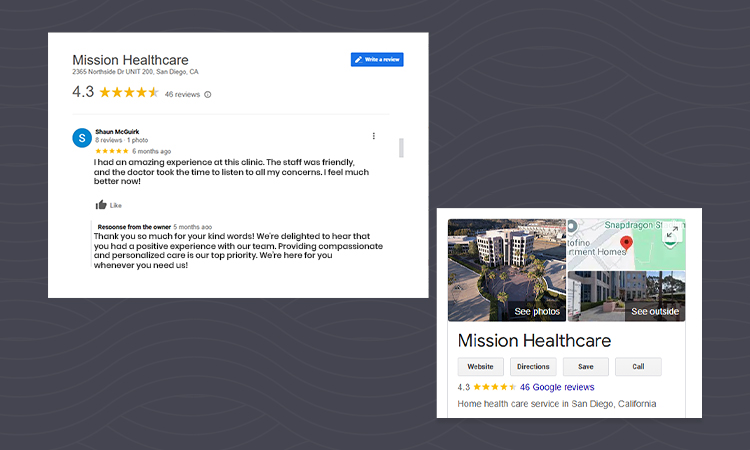
Patient reviews are crucial for building trust and increasing your rank in local searches in the healthcare industry.
For example, you can request patients to leave a good review about your doctors, your service quality, the promptness, or the costs of your clinic in the GBP. When doing so, remember to comply with HIPAA regulations by maintaining patient confidentiality and by not gathering feedback in exchange for incentives.
As a part of effective healthcare PR strategies, you should also engage with patients’ reviews. For example, remember to thank patients when they are sharing positive reviews and also respond professionally to negative ones. Avoid disclosing any personal information when responding to complaints digitally.
To further refine your local SEO strategy, conduct a review analysis. This will help you identify patients’ emotions and showcase possibilities for improvement. This will help you generate positive feedback and ultimately better local search engine rankings in the future.
3. Optimize your Website for Local Search Engines
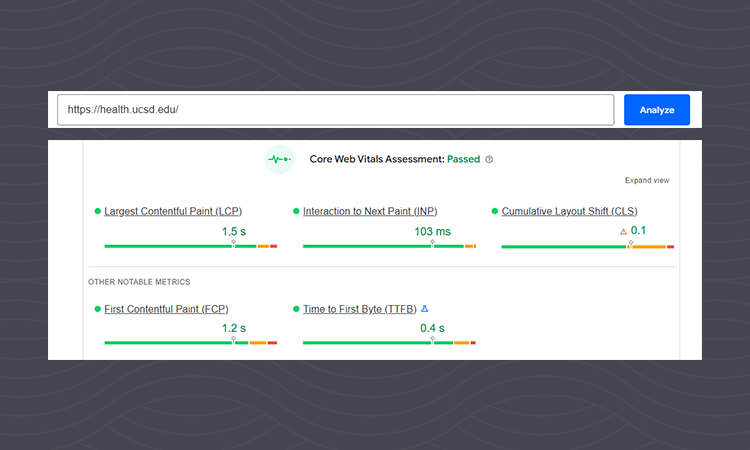
Your healthcare website is a lifesaver for local SEO. That is because it serves as an online hub for patients to look for detailed information about your medical practice. For this reason, your website also needs to be optimized.
For example, you need to make sure that your website loads fast, is easy to navigate across pages, and also fits well across diverse mobile screens. This will improve both patient experience and also your rankings in local search results.
Additionally, you should also include location-focused keywords in the blogs, meta descriptions, and service pages of your clinic. For example, these could be “gynecologists near me or local emergency doctors in California” if you are operating and providing such services in this area. Additionally, remember to create location pages on Google Maps if your clinic has branches in both New York and California.Lastly, remember to add local schema markup to optimize your website for local search engines. This will help local search engines understand your services and location better.
4. Optimize Directory Listings and Local Citations
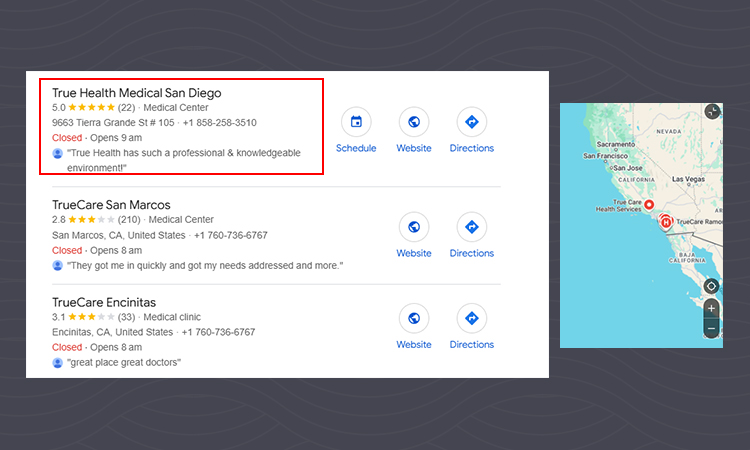
Another important part of local SEO for healthcare is local citations. This is when you mention the name, phone number, address, and other important information on third-party websites.
It’s important to be consistent here. This means that your name, address, and phone number (NAP) data must be identical in every online platform. For example, these could be broad listing websites like Google Maps or directories specific to the industry like Practo, Healthgrades, and so on.
You can also rely on local listing management tools to manage your citations. Additionally, conducting local citation audits regularly will help you update and manage your clinic’s data across different directories. This is important because inaccurate information like wrong phone numbers or obsolete addresses can confuse local patients and damage your SEO strategy leading to poor local search results.
5. Use Content Marketing for Local Healthcare SEO
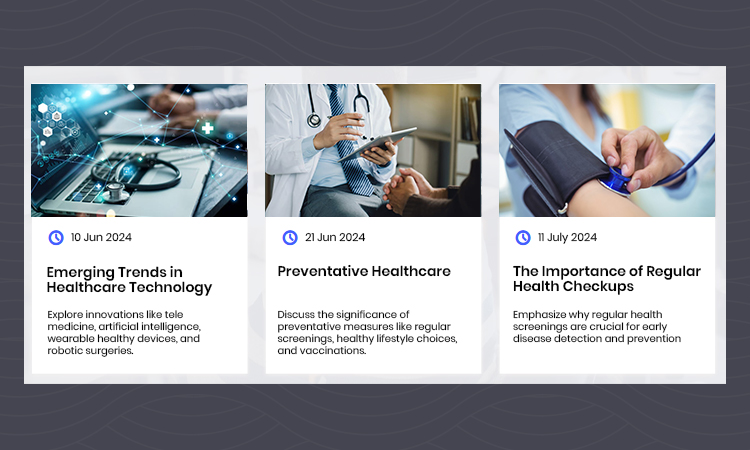
One of the most powerful local SEO for healthcare tools is to create and publish relevant content. This is because, in the healthcare industry, it is common for patients to conduct thorough, educational searches before visiting a practitioner.
Posting content that comes up in required searches can direct potential patients to your website when they are searching online. This will increase the likelihood of them choosing your practice when they are about to book an appointment.
Think about creating blogs, videos, articles,s or any other content that is relevant to your local patient community and provides answers to local healthcare concerns. For example, if your clinic is in an area that experiences hot and humid summers, you can publish a blog on healthcare tips to remain hydrated in summer. One of the tips could be to regularly use sunscreen to prevent skin cancer. People who are reading the article can then be redirected to book an appointment with a dermatologist from your clinic.
You can increase the authority and local search engine ranking of your website by regularly publishing location-focused content that is relevant to your clinical practice. To further boost your local SEO rankings, you can work with an expert medical SEO company and refine your marketing strategy.
6. Analyze and Modify Your Local SEO Strategy
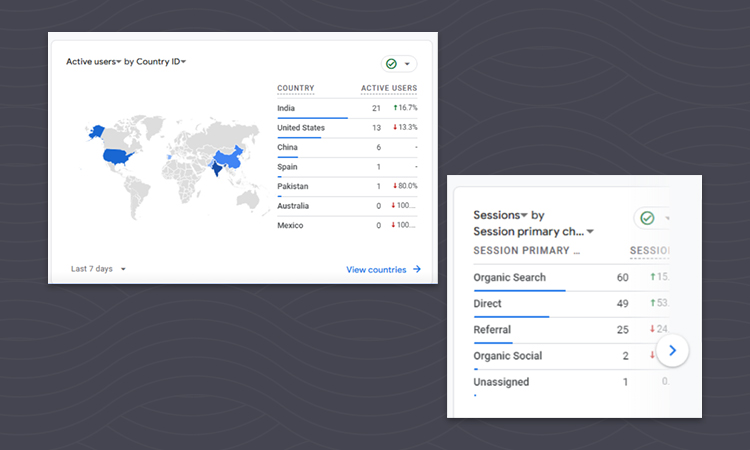
Your local SEO healthcare strategy isn’t a one-time project. Rather, it’s a continuous process that needs frequent adjustments and monitoring to be competitive. The right SEO and marketing tools can help you understand how your clinic ranks in different locations in the city. This will help you monitor and evaluate your SEO progress at a local level and accordingly optimize your website to attract more new local patients.
For example, using analytical tools like Google Analytics can show you how local users are finding and engaging with you or other healthcare local businesses. Use that data to adjust your SEO content to boost your marketing performance and generate more leads via organic local search engine results.
Additionally, you might want to hire a medical SEO for these tools. This is especially important if your organization does not have an in-house SEO department.
7. Implement Voice Search Optimization

This is when you modify your healthcare website to make it rank higher in voice search results. It usually includes long-tail keywords and conversational phrases based on the medical history, age, and preferences of the patient.
For example, you can incorporate phrases like “best emergency services in New York to match the conversational queries of your patients. You also need to include natural, everyday language in your content. For example, this can be “Which doctor is available today” to match voice search queries. Lastly, remember to optimize your website in a way that it provides instant answers to voice search questions raised by new users.
Local SEO Mistakes to Avoid by Your Healthcare Clinic
While there are many local clinics with a healthcare website, not all of them do a good job of marketing it. This leaves the web pages in the lowest part of the search page rankings. If you feel that your existing SEO strategy isn’t getting you any patients or traffic, chances are you might be making the following mistakes.
1. Not Writing Good Quality Content
The first step to writing good medical SEO content is to write for people. A regular patient of your clinic will not understand complex words or medical jargon. They want your content to be as easy to read as possible. This will not only increase your SEO rankings but also be viewed as useful healthcare advice by consumers, leading to better credibility.
The solution is to post educational content that is fun and creative for people to read. This will help you rank higher in search engines and also get new patients.
2. Incorrectly Using Keywords
More keywords don’t necessarily mean a better article. The following are some of the most common mistakes while using keywords in local SEO for healthcare:
- Keyword stuffing
- Not conducting keyword research
- Avoiding long-tail keywords
- Avoiding semantically related words
- Poor content quality due to over-optimization
- Not adding proper Meta descriptions, headers, and tags
- Not optimizing audio or video content.
Taking the time to do proper keyword research can be a solution to this problem. This will help you understand the keyword density for each term. Remember to include keywords naturally in the blog without overstuffing it.
3. Not Improving Your Website Speed
What will happen when you go to a website and it takes forever to load? You will probably leave it and look for another one!
Many clinics implementing local SEO strategies forget to optimize the loading speed of their website. This significantly affects their traffic and conversion rates.
Some common solutions to avoid this mistake include the following:
- Decreasing redirects
- Supporting compression
- Using browser caching
- Optimizing images and videos
- Improving response time for servers
4. Incorrectly Earning Backlinks
One of the best methods of local SEO for healthcare practices and ranking better on search engines is earning backlinks. These are links that credible websites use on their blogs to link to your website.
Backlinks are great to increase traffic for your local medical practice. However, sometimes local businesses try to develop local backlink networks. This is a form of cheating and you can get penalized by Google.
The solution, therefore, is to not buy backlinks. Using relevant keywords and writing good-quality content are the keys to getting more patients. The good news is that Google rewards organizations that generate SEO content organically.
5. Not Updating your Local SEO Strategy
Wouldn’t it be great if we all could create a single local SEO strategy for doctors that would bring our clinic to the top of search results? Sadly, the Internet is changing every day. Overlooking these changes can quickly bring your local practice down from the first to the third page of Google.
The solution is to carefully monitor changing trends in Google’s algorithms. If your website isn’t performing as well as it should, regardless of optimization, it might be a good idea to evaluate your metrics for improved solutions.
6. Copying Content From Others
While it can be tempting to replicate the content of your competitors, it only risks your chances of being penalized and losing your online reputation.
There’s only one way to resolve this – be creative! While you can always take inspiration from someone else’s content, you need to add your creative touch to it! For example, if you come across an interesting article on “Foods to Fight the Common Cold”, you can perhaps write something on “Local Fruits in Mumbai that can Boost your Immunity”. Remember that writing 100% original content is the only way to get better rankings for your local medical practice.
Conclusion
For healthcare providers, local SEO for healthcare is crucial to be discovered by patients in the neighborhood.
The best practices and tips outlined in this article are sure to help you generate trust with potential patients and local search engines alike. This will increase your online visibility in local Google search results, thereby facilitating more traffic to your practice. Alternatively, you can always rely on marketing experts from a good healthcare SEO agency.
Additional Resouces:
- Healthcare SEO For ‘Near Me’ Searches: Target People In Your Locality
- A Complete Guide to Healthcare Off-Page SEO Techniques
- PPC for Healthcare: Effective Strategies to Run Campaigns
- SEO for Medical Practices: Proven SEO Strategies for Higher Ranking
- Healthcare PR Strategies for Better SEO and Online Credibility



























